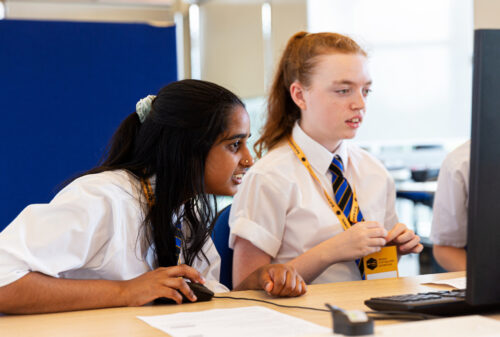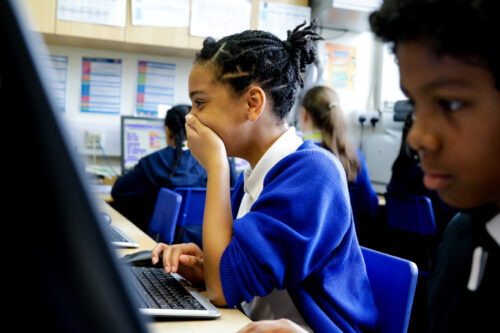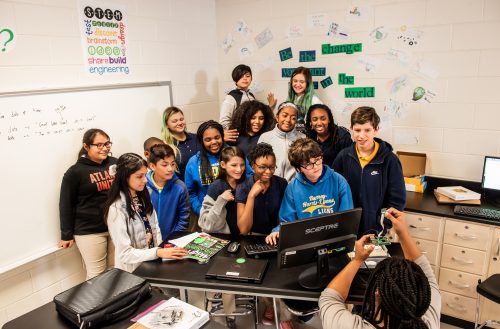Today we are sharing an evaluation report on another study that’s part of our Gender Balance in Computing research programme. In this study, we investigated the impact of using relevant contexts in classroom programming activities for 12- to 13-year-olds on girls’ and boys’ attitudes towards Computing.

We have been working on Gender Balance in Computing since 2018, together with partner organisations Behavioural Insights Team, Apps for Good, and WISE, to conduct research studies exploring ways to encourage more girls and young women to engage with Computing in school. The research programme has been funded by the Department for Education, and we deliver it as part of the National Centre for Computing Education. The report we share today is about the penultimate study in the programme.
Components of a Computing curriculum
A typical Computing curriculum is built around content: a list of concepts, knowledge, and skills that will be covered during the course. For some learners, that list will be enough to motivate and engage them in Computing. But other learners require more to engage with the subject, such as context about how they can use the computing skills they learn in the real world. Crucially, this difference between learners is often gendered. Research has shown that many boys become absorbed by the content in Computing courses, whereas for many girls the context for using computing skills is more important, and this context needs to relate to a variety of relevant scenarios where computing can solve problems.

Developing teaching materials to highlight the relevance of Computing
In the Relevance study, we worked together with colleagues from Apps for Good to create teaching materials that present Computing in contexts that were relevant to pupils’ own interests. To do this, we drew on a research concept called identification. This states that when learners become interested in a topic because it relates to part of their own identity, that makes the subject more personally meaningful to them, which in turn means that they are more likely to continue studying it. In the materials we created, we drew on learners’ identities based on the communities that they belonged to (see image below). The materials asked them to identify the connections they had to their own communities, and to then use this as the context to design and create a mobile phone app.

“I feel a sense of achievement in Computing when making your ideas a reality makes you proud of your creation, which is rewarding.” (Female learner, Relevance study evaluation report p. 57)
The Relevance research study
Between January 2022 and April 2022, more than 95 secondary schools were part of our study investigating the effect that learning with these resources might have on the attitudes of Year 8 pupils (aged 12–13) towards Computing. We are very grateful to all the schools, pupils, and teachers who took part in this study.
To enable evaluation of the study as a randomised controlled trial, the schools were randomly divided into two groups: a ‘control’ group that taught standard Computing lessons, and a ‘treatment’ group that delivered the intervention materials we had developed. The impact of the intervention was independently evaluated by the Behavioural Insights Team using data collected from pupils via surveys at the start and end of the intervention. The evaluators also collected data while conducting lesson observations, pupil group discussions, teacher interviews, and teacher surveys to understand how the intervention was delivered.
The girls who took part in the intervention chose an interesting range of contexts for their apps, including:
- Solving problems in the school community, such as homework timetabling and public transport
- Interest-based communities, such as melody-making and interior design
- Issues in wider communities, such as sea life population and mental health
“I feel like it’s an important subject, and I feel like sea life is at risk right now, and I want to help people realise that.” (Female learner, Relevance study evaluation report p. 60)
“I feel like computing can create apps to do with solving mental health problems, which I think are very important and personally need a lot of improvement on the way we can cope with mental health.” (Female learner, Relevance study evaluation report p. 60)
What we learned from the Relevance study
The start of this blog refers to the core components of a Computing curriculum: concepts, knowledge, and skills. One way of building a curriculum is to list these components and develop a scheme of work which covers them all. However, in a recent computing education paper, researchers present an alternative way: developing curricula around the possible endpoints of learners. For computing, one endpoint could be the economic opportunities of a programming career, but equally, another could be using digital technologies for creative expression. The researchers argue that when learners have the opportunity to use computing as a tool related to personally meaningful contexts, a more diverse group of learners can become engaged in the subject.

Girls who took part in our Relevance study expressed the importance of creativity. “I think last term we had instructions and you follow them, whereas now it’s like your own ideas and your own creativity and whatever you make,” said one female learner (report, p. 56). The series of lessons where learners designed a prototype of their app was particularly popular among girls because this activity included creative expression. Girls who see themselves as creative align their interests with subjects that allow them to express this part of their identity.

Based on learner responses to a ‘yes/no’ question about whether they were likely to choose GCSE Computer Science, the evaluators of the study found no statistically significant differences between the students who were part of the treatment and control groups. However, when learners were asked instead to select from a list which subjects they were likely to choose at GCSE, there was a statistically significant difference in the results: girls from schools in the treatment group were more likely to choose GCSE Computer Science as one of their options than girls in the control group. This finding suggests that it would be beneficial to gender balance in Computing if educators who design Computing curricula consider multiple endpoints for learners and include personally meaningful contexts to create learning experiences that are relevant to diverse groups of learners.
Find out more about making computing relevant for your learners
- Read the full evaluation report about this study
- Watch this video to find out more about the relevance of Computing in a range of careers
- Learn more about how to make Computing relevant for learners in our special edition of Hello World, The Big Book of Computing Pedagogy
This is the penultimate report to be published about the studies that are part of the Gender Balance in Computing programme. If you would like to stay up-to-date with the programme, you can sign up to our newsletter. Our final report is about a study that explored the role that options booklets and evenings play in students’ subject choice.
The post Using relevant contexts to engage girls in the Computing classroom: Study results appeared first on Raspberry Pi.
Source: Raspberry Pi – Using relevant contexts to engage girls in the Computing classroom: Study results


